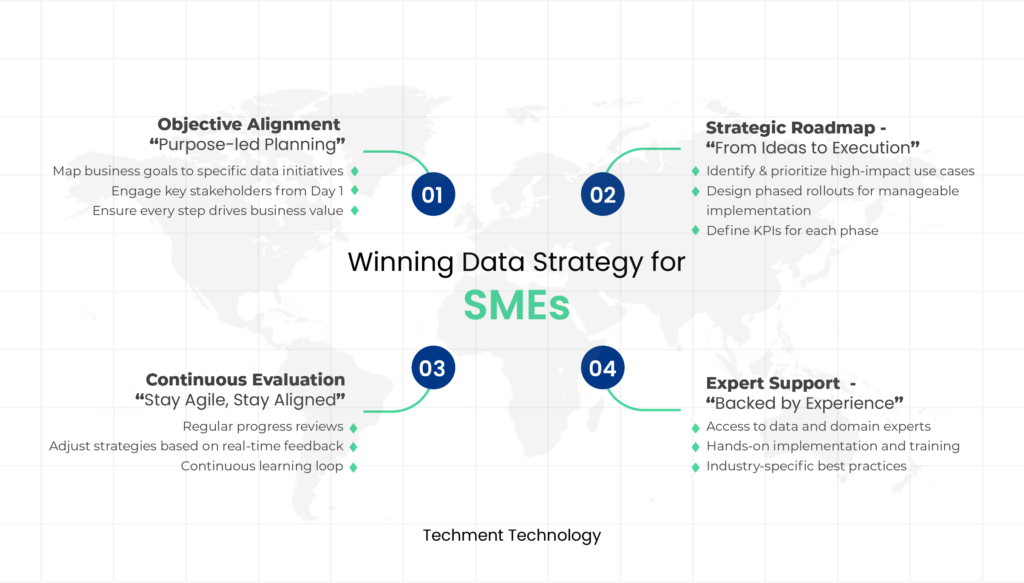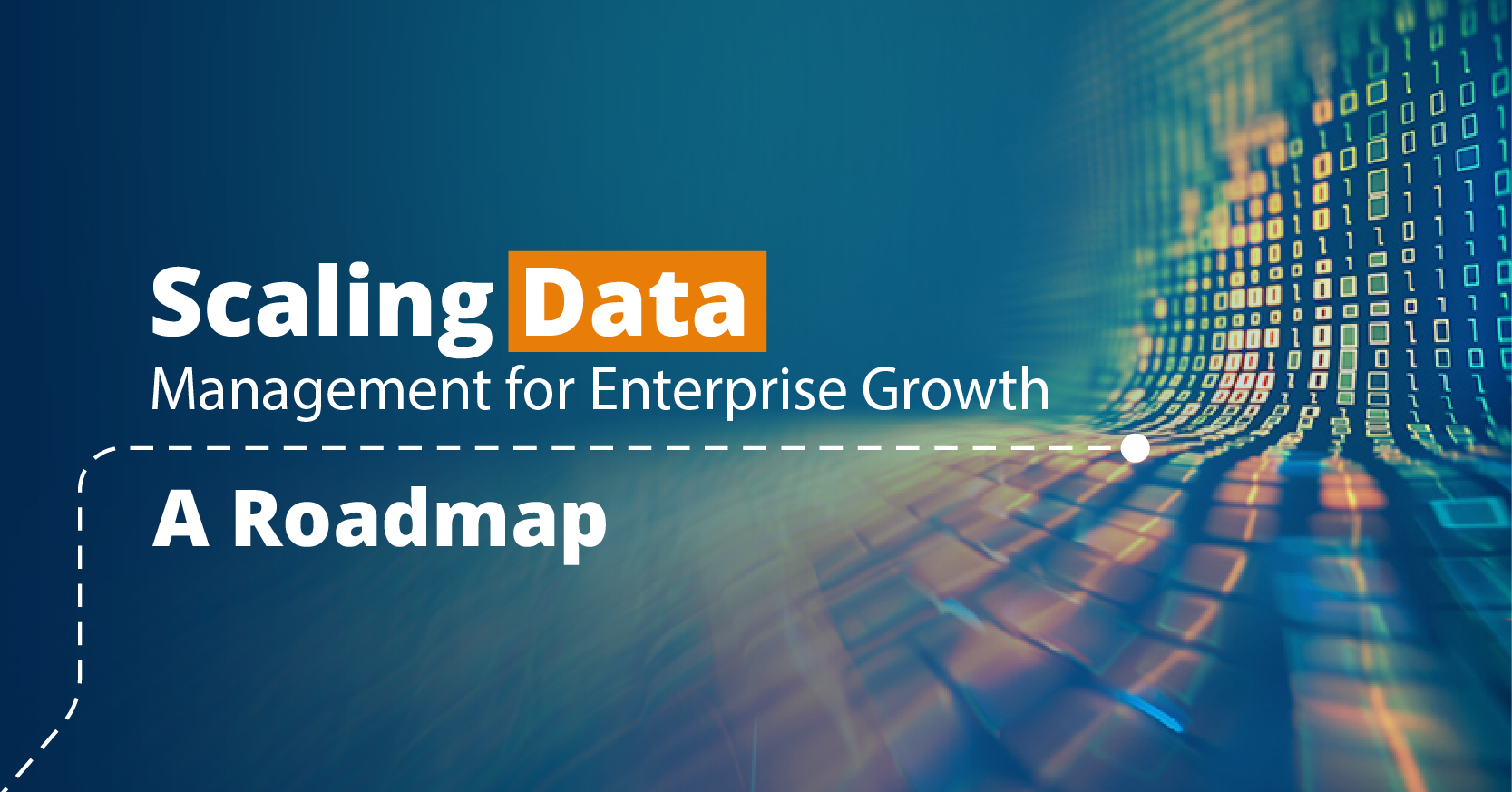In today’s digital-first world, data isn’t just a byproduct of doing business—it’s the fuel that drives smarter decisions, operational efficiency, and long-term growth. For small and mid-sized enterprises (SMEs), building a solid data strategy for SMEs isn’t a luxury—it’s a necessity to stay competitive, agile, and future-ready. Whether your goals include scaling operations, boosting revenue, or delivering personalized customer experiences, a well-structured data strategy empowers you to unlock hidden value in your data and turn it into measurable business impact.
Read on the blog further to discover how to turn the information you already collect into your biggest competitive advantage, without needing a data science degree or expensive software.
Understanding a comprehensive Data Strategy for SMEs can significantly enhance your business capabilities and drive sustainable growth.
Find the below sections for further reading:
- What Is a Data Strategy?
- Key Benefits Of Having A Data Strategy For SMEs
- The Core Components of a Winning Data Strategy for SMEs
- Techment’s Proven Framework for Data Strategy
- Our Comprehensive & Scalable Data Services
- The Bottom Line
What Is a Data Strategy?
A data strategy is a structured plan that outlines how your business will collect, manage, store, analyze, and leverage data to meet its objectives. It acts as your digital roadmap, helping you align data initiatives with business goals while adapting to evolving market conditions. Your customer service team will anticipate common problems before customers even call. Your marketing budget will go toward activities that actually bring in customers, not just likes and clicks. You’ll stock the right products at the right times, hire during busy seasons, and notice opportunities your competitors miss entirely.
Unlike off-the-shelf solutions, a good data strategy is:
- Customizable: Tailored to your unique needs and budget
- Scalable: Grows with your business
- Incremental: Allows you to start small, show progress, and expand
Key Benefits Of Having A Data Strategy For SMEs
A Harvard Business Review study found that data and AI leaders outperform peers in customer loyalty and retention (77% vs. 45%), and 84% of these leaders have a clear strategy for extracting value from data, which includes customer understanding. SMEs are increasingly recognizing that decisions based on gut feelings are no longer successful in a data-driven world. A tailored data strategy helps you:

- Streamline operations through better visibility and automation
- Improve decision-making using actionable insights
- Gain a competitive edge by identifying trends and customer behaviors faster than the competition
- Personalize engagement for higher customer retention and loyalty
- Forecast future growth using predictive analytics
In short, a smart data strategy gives SMEs the precision and power typically reserved for larger enterprises.
The Core Components of a Winning Data Strategy for SMEs
Crafting a data strategy isn’t about complexity—it’s about clarity, alignment, and long-term value. For SMEs, a well-structured data strategy is the difference between reactive operations and proactive growth. Here are the essential building blocks tailored for small and mid-sized businesses:
1. Define Business Objectives
Start with SMART (Specific, Measurable, Achievable, Relevant, Time-bound) goals. Whether it’s improving customer retention or boosting operational efficiency, data initiatives must tie back to business outcomes. In fact, companies that align data management and governance strategies are 33% more likely to outperform peers, according to Gartner Data and Analytics report.
2. Assess Your Current Data Landscape
Evaluate what data exists, where it’s stored, and how it’s being used. Identify redundancies and gaps According to a report by Small Enterprise Magazine, 74% of Indian SMEs struggle to derive meaningful value from their data—a clear indication of gaps in their IT infrastructure. From data collection to integrated analytics, these businesses need robust systems tailored to their unique needs.
3. Secure Stakeholder Buy-in
A winning data strategy needs broad participation. Involve business leaders, IT teams, and data users early. Clarify data ownership and accountability. In its report on AI in the workplace, McKinsey highlights that a lack of leadership engagement is one of the most significant barriers to successful AI adoption, reinforcing the critical role of executive sponsorship in driving data and AI initiatives forward.
Additionally, McKinsey’s research on organizational growth mindsets reveals that companies with proactive, growth-oriented leadership consistently outperform their peers, with some achieving up to 50% higher total shareholder returns.
4. Set a Realistic Budget
Data success doesn’t require big spending. Start small—use open-source or pay-as-you-grow tools. Align tech investments with your current scale and future goals. When a data product was scaled to another market, projected costs were about 40% lower compared to building individual solutions—demonstrating the efficiency and ROI benefits of starting with reusable, pilot-ready architectures
5. Implement Scalable Data Collection & Storage
Adopt cloud-based platforms or hybrid solutions that can unify data from multiple touchpoints. Choose systems with APIs and data integration capabilities. This ensures future readiness for AI and automation.
6. Prioritize Data Quality
Decisions are only as good as the data behind them. Focus on the “seven pillars of data quality”: accuracy, completeness, consistency, validity, timeliness, uniqueness, and integrity. Poor data quality costs companies $12.9 million annually .
7. Establish Data Governance
Implement lightweight yet robust governance practices that ensure data privacy, accessibility, and regulatory compliance without introducing operational bottlenecks. According to a McKinsey report, effective data governance is among the top three differentiators between organizations that unlock significant value from their data and those that fall short.
8. Strengthen Data Security
Use role-based access, encryption, and basic compliance checks. As you grow, explore frameworks like ISO 27001 or industry-specific standards.
9. Deploy Easy-to-Use Business Analytics Tools
Leverage tools like Power BI, Looker, or Tableau to democratize data. Empower teams to build their own dashboards and derive insights. Data-literate teams are 23% more productive, as per a report.
Techment’s Proven Framework for Data Strategy
Techment simplifies the path with a structured, collaborative approach designed specifically for SMEs:
- Objective Alignment: Techment works closely with stakeholders to map business goals to data initiatives—ensuring every step has purpose.
- Strategic Roadmap: Prioritize high-impact use cases and design phased rollouts for measurable ROI.
- Continuous Evaluation: Progress is tracked regularly to recalibrate initiatives and stay on course.
- Expert Support: SMEs benefit from domain-specific insights and hands-on implementation expertise.
Our Comprehensive & Scalable Data Services : Techment provides end-to-end data engineering solutions from architecture design and pipeline development to warehouse optimization. These services centralize and streamline data, making it scalable, secure, and accessible.
AI-Powered Integration & Quality : AI-driven tools eliminate data silos, enabling real-time, cross-functional insights. Automated cleansing and validation ensure consistent, reliable data—vital for decision-making, analytics, and compliance.
Cloud-Native Flexibility: With cloud-native solutions like server less computing and microservices, SMEs gain the agility to scale operations without bloating infrastructure costs.
The Bottom Line: Your Data Has Value—Let’s Unlock It, Together
If you’ve made it this far, chances are you already know that your business collects more data than ever before. The real question is—are you using it to its full potential?
Whether you’re trying to streamline operations, understand your customers better, or prepare for what’s next, a strong data strategy can be your most valuable asset. And it doesn’t have to be overwhelming or expensive. You just need a clear roadmap, the right guidance, and a partner who understands the unique realities of running an SME.
At Techment, we work closely with leaders like you—people who are wearing many hats, moving fast, and aiming to make smart, sustainable decisions. Our goal is simple: to make data work for you, not the other way around.
If you’re ready to start turning your data into decisions that drive growth, grab our free eBook: “The Data Strategy Playbook: 7 Steps to Transform Your SME’s Data into Profit” Or let’s talk. Our resident Data Architect would love to hear about your goals and help design a plan that fits your journey.
 All Posts
All Posts
